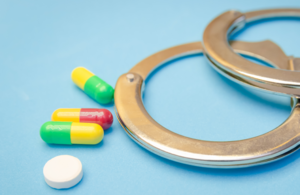Pharmacists who illegally supplied more than 55 million doses of controlled drugs sentenced
Two pharmacists who sold ‘industrial’ quantities of Class C controlled drugs were yesterday sentenced to two years’ imprisonment each, suspended for 24 months, at Southwark Crown Court following an investigation by the Criminal Enforcement Unit of the Medicines and Healthcare Products Regulatory Authority (MHRA).

Having both pleaded guilty at an earlier hearing, Mandip Sidhu (47) of Littleover, Derby was sentenced to two years imprisonment on each of five counts of supplying Class C drugs and four months for forgery, all to run concurrently and suspended for 24 months on the condition that she completes 200 hours of community service for her role in the illegal supply of diazepam, zolpidem and zopiclone.
Nabeil Nasr (42) of Cheadle, Greater Manchester, received a prison sentence of two years for each of two counts of supplying Class C drugs diazepam and zopiclone and one year for each of two counts of wholesale dealing without a wholesale licence, suspended for 24 months, also on the condition that he complete 200 hours community service.
The offences in both cases, which saw both Sidhu and Nasr illegally supplying Class C drugs on what was described in court as an ‘industrial scale’, took place between May 2013 and June 2017.
Between them, Sidhu and Nasr unlawfully supplied over 55 million doses of Class C controlled drugs. Of those, over 47 million doses were of diazepam.
Both Sidhu and Nasr were pharmacists registered with the General Pharmaceutical Council at the time of offending; Sidhu the director of Pharmaceutical Health Limited (PHL), based in Derby, and Nasr owned several pharmacies across the North West of England.
Ms Sidhu also pleaded guilty to a charge of forgery, in which she made a false invoice in an attempt to mislead an inspector from the MHRA into believing medicines had been sold to a company outside the European Economic Area.
The court heard that PHL, the company of which Sidhu was a director, purchased 4.27 million tablets in August 2014, and 4.5 million tablets in March 2015, even though PHL had not legally dispensed any medicines against a prescription since July 19, 2013.
For perspective, around 5 million diazepam tablets were legally dispensed against prescription in the whole of England during 2014.
These figures were dwarfed by the quantities of drugs passing through the hands of Sidhu and Nasr.
Andy Morling, MHRA Deputy Director (Criminal Enforcement), said:
This sentencing follows a thorough and complex investigation conducted by our Criminal Enforcement Unit.
Our staff showed exceptional determination, skill and professionalism in bringing Nabeil Nasr and Mandip Sidhu to justice.
This successful prosecution demonstrates that the MHRA will use the full range of powers and tools available to us to protect the public from the harm caused by those illegally trading in powerful medicines.
In order for a pharmacist or wholesale business owner to legally trade in these medicines, they need to hold a Home Office Controlled Drug Licence (HOCDL). The licence must also be endorsed by the MHRA before it can be used to buy or sell drugs in high quantities. While both Sidhu and Nasr held various licences for their work as pharmacists, neither held an HOCDL.
Notes to editors
- The specific offences that Mandip Sidhu was convicted of were: Five counts of supplying the Class C drugs diazepam, zopiclone, zolpidem contrary to section 4(1) of the Misuse of Drugs Act 1971 and one count of falsifying an invoice contrary to section 1 of the Forgery and Counterfeiting Act 1981.
- The specific offences that Nabeil Nasr was convicted of were: Two counts of supplying the Class C drugs diazepam and zopiclone contrary to section 4(1) of the Misuse of Drugs Act 1971 and two counts of distributing diazepam and zopiclone by way of wholesale dealing otherwise than in accordance with a wholesale dealer’s licence, contrary to regulation 34(1) and 35(1) of the Human Medicine Regulations 2012.
- The Criminal Enforcement Unit is a dedicated law enforcement capability within the MHRA. The unit collects and analyses criminal intelligence to identify illegal activity involving medical products and investigates cases to prevent and disrupt offending and bring offenders to justice.
- The Medicines and Healthcare products Regulatory Agency (MHRA) is responsible for regulating all medicines and medical devices in the UK by ensuring they work and are acceptably safe. All our work is underpinned by robust and fact-based judgements to ensure that the benefits justify any risks.
- The MHRA is an executive agency of the Department of Health and Social Care (DHSC).
- For media enquiries, please contact the newscentre@mhra.gov.uk, or call on 020 3080 7651.